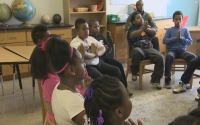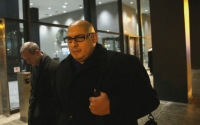Getting Schooled: The Battle for Better Education
Next week “America Tonight” examines five sides of America’s education crisis and the efforts to address it, in the special series Getting Schooled.
From the parents who risk jail time to send their children to better schools to a radical plan to flip classrooms to enhance performance, “America Tonight” will explore in depth the problems — and the possibilities — in the quest to change how American children are getting schooled.
Every night, we’ll air a new report, with more to explore online. Special correspondent Soledad O’Brien kicks off the series on Monday at 9 p.m. ET.

In America, every child is entitled to an education, but it doesn’t have to be a good one. Because schools are funded by local property taxes, rich neighborhoods often get high-end schools and poorer neighborhoods often get strapped ones. Special correspondent Soledad O’Brien documents the desperate attempts of parents to cross that boundary and the intense effort of states and school boards to police them out. She profiles parents arrested for theft of education and interviews educators about the conflict between serving their community and denying a better education to the most in need.
Following the report, explore our website to learn more about the growing boundary-hopping detective industry and the patchwork of laws designed to deter and punish those who dare to pilfer more opportunity for their kids.

Home-schooling has been one of the most successful social movements of the last 50 years. Back in 1980, when it was largely seen as a faith-based fringe movement, home schooling was illegal in 30 states. By 1993, it was recognized as a parent's right across the country. And today, there are nearly 1.8 million home-schooled American children, according to the Department of Education. Despite its explosive growth, home schooling is still a remarkably deregulated enterprise. Half of all states require parents to simply register their intent to home school, and 11 states have no regulations at all. Correspondent Sheila MacVivar explores whether the lack of regulation is leaving children vulnerable to educational neglect, and even abuse, with few ways of finding help.
Are you involved with home schooling? We want to hear from you. Tell us the best and worst parts of your home schooling experience, and whether you think your state should regulate it more. Share your responses with us here, or using the hashtag #homeschoolkid on Twitter.
The water balloon fight at Enloe High School in Raleigh, N.C., last May was a well-advertised end-of-year prank. But school officials didn’t find it funny, and neither did the police department. Officers arrested eight students, charging most of them with disorderly conduct. All but one were black. Correspondent Sarah Hoye explores what the Legal Aid of North Carolina calls the growing “school-to-prison pipeline,” in which black students are far more likely than their white peers to be suspended, expelled or arrested for the same conduct at school. She looks at the policies behind these racial disparities and recent efforts to close the gap. And learn more about how the pipeline -- what advocates call "one of the greatest civil rights challenges today" -- plays out across the rest of the country.
What can be done to help students who get caught up in the “school-to-prison pipeline”? On Wednesday, join us for a Branch coversation with Soledad O'Brien, Sarah Hoye and leading education advocates about the problems in play, and the efforts to change them.

For young men, success in algebra could be a bellwether. In Chicago, where gang-related bloodshed has become far too common, Chris Bury follows one intensive tutoring program called Match Education as it tries to help 1,000 male high school students graduate and stay off the streets. Created by Stig Leschly, Jeff Bezos’ former “shadow” at Amazon, the program’s findings are remarkable: Young males who successfully finished an algebra class tend to graduate from high school while those who didn’t were more likely to drop out.

The United States desperately needs more talented minds in science, tech, engineering and math (STEM). And the numbers show we’re lousy at molding them. About a quarter of college students who start pursuing a STEM major switch to another subject, according to the Department of Education, and another quarter drop out of college altogether. There are now more foreign students than American students studying STEM subjects at U.S. graduate schools. But some STEM departments are bursting with optimism, and Adam May sat in on a few so-called flipped classes: Lectures are watched at home, and homework is done in class. He uncovers why hundreds of schools are adopting this concept, with some even constructing buildings based on it. And he breaks down why the retention rate for STEM students taught this way is four times higher for black students and five times higher for women.
Share your thoughts with us using the #GettingSchooled hashtag, and explore more online at AlJazeera.com/AmericaTonight.













Error
Sorry, your comment was not saved due to a technical problem. Please try again later or using a different browser.